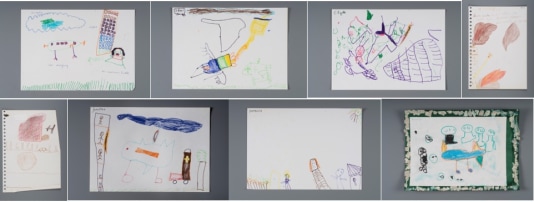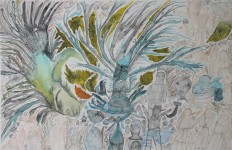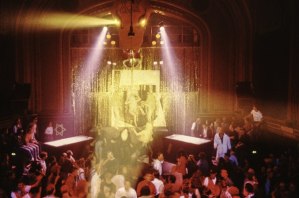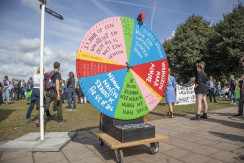Op zondag 25 september 2022 opent de tweede tentoonstelling vanuit het verzamelproject Collecting the City in het Amsterdam Museum. In het project Collecting the City (2021-2025) ‘verzamelt’ en presenteert het Amsterdam Museum samen met gemeenschappen, particulieren en instellingen uit Amsterdam de verhalen en objecten van de stad van nu. In deze tweede tentoonstelling van de programmalijn brengt het Amsterdam Museum opnieuw samen met drie partners uit de stad verschillende onderwerpen onder de aandacht. Ditmaal met: Imagine IC (over de Bijlmervliegramp), fotograaf Cleo Campert (over haar Club RoXY) en Museum om de Hoek (over de wooncrisis in Amsterdam).
Met het project Collecting the City wil het Amsterdam Museum samen met de stad het Amsterdam van nu verzamelen. Tot 2025, wanneer de stad Amsterdam 750 jaar wordt, werkt het museum aan het aanvullen van zijn collectie met thema’s die mensen in de stad bezighouden. In die periode delen buurtmusea, netwerken, lokale kunstenaars en bevlogen bewoners hun verhalen en objecten over Amsterdam. Elk half jaar worden nieuwe particulieren en partijen uitgenodigd om hun ideeën uit te voeren. Denk aan een nieuw perspectief op het verleden, een mooi of juist pijnlijk moment in het heden of een toekomstvisie op de stad.
“Wat hebben de Bijlmervliegramp, Club RoXY en de wooncrisis met elkaar gemeen? Nou, dat mensen in de stad het onderwerpen vinden die de stad hebben gevormd of vormen en die daarom een plek zouden moeten krijgen in het Amsterdam Museum. ” zegt Gonca Yalciner van het Amsterdam Museum: “Wie beter dan de mensen in de stad weten wat de stad van nu behelst en wat mensen in de stad bezig houdt? Door te luisteren en samen te creëren (co-creatie) proberen we die levendige stad zoveel mogelijk te vatten zodat de collectie van het Amsterdam Museum aan het einde van het project in 2025 een veel completer verhaal van Amsterdam vertelt. ” Deze tweede editie van Collecting the City neemt bezoekers vanuit drie samenwerkingspartners mee langs drie thema’s.
30 jaar Bijlmervliegramp
Op 4 oktober 2022 is het precies dertig jaar geleden dat een Boeing 747 van luchtvaartmaatschappij El Al neerstortte op de flats Groeneveen en Klein-Kruitberg in de Amsterdamse Bijlmermeer. Een ingrijpende gebeurtenis die veel mensen in de stad van vandaag nog steeds met zich meedragen. Samen met Imagine IC, de in Zuidoost gevestigde erfgoedinstelling, luisterde het Amsterdam Museum in diverse stadsgesprekken naar Amsterdammers die met het museum over de ramp wilden praten. De inhoud van die gesprekken vormde de basis van deze tentoonstelling; de expositie gaat over het gevoel die Amsterdammers bij de ramp hebben, hoe zij herdenken en de manier hoe verschillende generaties dit trauma samen verwerken. Een tentoonstelling júíst in het centrum van Amsterdam zodat er, naar de wens van bewoners, ook buiten de grenzen van het stadsdeel meer bewustzijn wordt gecreëerd. Bij Imagine IC in de Bijlmer is gelijktijdig een tentoonstelling over de Bijlmervliegramp te zien.
 In de tentoonstellingszalen in het Amsterdam Museum wordt een idee geschetst van het ongeloof, de shock en het verdriet waar veel bewoners van de Bijlmer mee te maken kregen. Dit gebeurt aan de hand van koppen van kranten die op 5 oktober verschenen – ‘Vuur, dood, chaos’ en ‘Ineens ging hij op zijn kant en recht omlaag’ – en door op doek getranscribeerde gesprekken die de meldkamermedewerkers van 112 van die avond voerden. Ook zijn tekeningen van basisschoolleerlingen van toen te zien. De tekeningen geven inzicht hoe kinderen deze gebeurtenis ervaren hebben. Drie docenten die kinderen destijds middels tekenen hun trauma wilden laten verwerken blikken nu terug.
In de tentoonstellingszalen in het Amsterdam Museum wordt een idee geschetst van het ongeloof, de shock en het verdriet waar veel bewoners van de Bijlmer mee te maken kregen. Dit gebeurt aan de hand van koppen van kranten die op 5 oktober verschenen – ‘Vuur, dood, chaos’ en ‘Ineens ging hij op zijn kant en recht omlaag’ – en door op doek getranscribeerde gesprekken die de meldkamermedewerkers van 112 van die avond voerden. Ook zijn tekeningen van basisschoolleerlingen van toen te zien. De tekeningen geven inzicht hoe kinderen deze gebeurtenis ervaren hebben. Drie docenten die kinderen destijds middels tekenen hun trauma wilden laten verwerken blikken nu terug.
Naast twee brokstukken van het vrachtvliegtuig die zijn gevonden en bewaard door particulieren zijn er ook kunstwerken over de Bijlmervliegramp te zien. Zo maakte kunstenaar Samuel Sarmiento (Venezuela, 1987) als eerbetoon aan de slachtoffers het schilderij ‘De boom die alles zag – El arbol que lo vio todo’ en laat kunstenaar Fatric Bewong (Ghana, 1981) in een video-installatie zien hoe de ramp vandaag de dag wordt herdacht binnen de gemeenschappen. Beide kunstenaars zijn verbonden aan CBK Zuidoost, centrum voor actuele beeldende kunst vanuit een interculturele, inclusieve invalshoek. Aan het einde van de tentoonstellingszalen worden alle bezoekers uitgenodigd om, naar idee van Tess van Zalinge, gezamenlijk een geborduurd lappendeken van herinneringen te maken.

 Bij Imagine IC wordt in een expositie over 30 jaar Bijlmervliegramp middels een drieluik stilgestaan bij de impact die de ramp 30 jaar na dato nog altijd heeft. Zo zijn er verhalen, herinneringen en emoties te beluisteren en te bekijken in een daarvoor opgestelde living memory presentatie, worden video’s getoond met verdiepende documentaires en worden een aantal objecten uitgelicht die als onderdeel van de vaste opstelling van de Vitrine van Zuidoost het hele jaar door te zien zijn.
Bij Imagine IC wordt in een expositie over 30 jaar Bijlmervliegramp middels een drieluik stilgestaan bij de impact die de ramp 30 jaar na dato nog altijd heeft. Zo zijn er verhalen, herinneringen en emoties te beluisteren en te bekijken in een daarvoor opgestelde living memory presentatie, worden video’s getoond met verdiepende documentaires en worden een aantal objecten uitgelicht die als onderdeel van de vaste opstelling van de Vitrine van Zuidoost het hele jaar door te zien zijn.
Ode aan Zubrowka, de Muze van Club RoXY
In haar presentatie Ode aan Zubrowka, de Muze van club RoXY toont Cleo Campert een ode aan Club RoXY in het algemeen en aan performing artist Zubrowka International in het bijzonder. Campert was huisfotograaf van Club RoXY, de iconische Amsterdamse houseclub die in 1999 afbrandde. Campert deelt haar herinneringen aan de club die in de jaren ‘80 en ‘90 een paradijselijk toevluchtsoord was voor iedereen die wilde ontsnappen aan de grijze buitenwereld. In een installatie creëert Campert met video’s en cassettes uit haar eigen archief een herbeleving van eindeloze, wilde nachtfeesten vol creativiteit en zelfexpressie. Een silent disco haalt een microversie van de nachtclub naar het heden.

 De tweede installatie van Campert zoomt in op de mensen die Club RoXY tot zo’n uitzonderlijke plek maakten. Waarbij Campert speciale aandacht geeft aan performing artist Zubrowka. Een fotoreeks, troon en kijkdozen bieden een overzicht van haar flamboyante verschijningen en humorvolle optredens die de vrije geest van de discotheek belichaamden. In de woorden van Campert: “Het publiek kon zich aan Zubrowka laven. Voor mij als fotograaf was zij een heerlijk onderwerp, er viel altijd iets met haar te beleven voor de camera. Zubrowka is de Muze van de RoXY.”
De tweede installatie van Campert zoomt in op de mensen die Club RoXY tot zo’n uitzonderlijke plek maakten. Waarbij Campert speciale aandacht geeft aan performing artist Zubrowka. Een fotoreeks, troon en kijkdozen bieden een overzicht van haar flamboyante verschijningen en humorvolle optredens die de vrije geest van de discotheek belichaamden. In de woorden van Campert: “Het publiek kon zich aan Zubrowka laven. Voor mij als fotograaf was zij een heerlijk onderwerp, er viel altijd iets met haar te beleven voor de camera. Zubrowka is de Muze van de RoXY.”
Museum om de hoek #2: Operatie wonen
In de laatste drie ruimtes van Collecting the City vindt opnieuw een bijzondere samenwerking plaats met ‘Museum om de Hoek’ waar 23 buurtmusea uit Amsterdam in wisselende samenstelling kleine tentoonstellingen maken. Ditmaal maken Museum Amsterdam Noord, Historisch Archief De Baarsjes, Van Eesteren Museum en Borneo Architectuur Centrum samen een tentoonstelling waarin vanuit het heden teruggeblikt wordt op een eeuw Amsterdamse wooncultuur. Het resultaat is een kritische reflectie op de ontwikkeling en de huidige woonsituatie in vier Amsterdamse wijken in stadsdelen waar de buurtmusea gevestigd zijn – Van der Pekbuurt, De Baarsjes, Slotermeer en het Oostelijk Havengebied.
 Een van de eyecatchers van de rijkelijk gevulde tentoonstellingszalen van Museum om de Hoek is Het Rad van (On)fortuin uit de collectie van het Amsterdam Museum. Het Rad toont tien bedenkelijke mogelijkheden voor jongeren op een woning in de hoofdstad anno 2021. Een pijnlijk tijdsbeeld want, of je wilt of niet, iedereen uit Amsterdam doet mee aan de loterij die onze woningmarkt is. De makers van het Rad, Hans de Tweede (1997) en Tycho (1994), namen het Rad op 12 september 2021 mee naar het massale woonprotest in het Westerpark. Bij dit protest waren ruim tienduizend mensen aanwezig om hun frustratie over het woonbeleid te laten horen. Het Amsterdam Museum nam het Rad van (On)fortuin op in zijn collectie.
Een van de eyecatchers van de rijkelijk gevulde tentoonstellingszalen van Museum om de Hoek is Het Rad van (On)fortuin uit de collectie van het Amsterdam Museum. Het Rad toont tien bedenkelijke mogelijkheden voor jongeren op een woning in de hoofdstad anno 2021. Een pijnlijk tijdsbeeld want, of je wilt of niet, iedereen uit Amsterdam doet mee aan de loterij die onze woningmarkt is. De makers van het Rad, Hans de Tweede (1997) en Tycho (1994), namen het Rad op 12 september 2021 mee naar het massale woonprotest in het Westerpark. Bij dit protest waren ruim tienduizend mensen aanwezig om hun frustratie over het woonbeleid te laten horen. Het Amsterdam Museum nam het Rad van (On)fortuin op in zijn collectie.
Collecting the City #2 is te zien vanaf zondag 25 september 2022 tot en met dinsdag 21 mei 2023 in het Amsterdam Museum aan de Amstel, Amstel 51. Deze editie is tot stand gekomen in samenwerking met ImagineIC, CBK Zuidoost, Cleo Campert en Museum om de Hoek. Het project Collecting the City wordt ondersteund door het VSBFonds en Gemeente Amsterdam. Het Amsterdam Museum wordt structureel ondersteund door Gemeente Amsterdam en de VriendenLoterij.
Het Amsterdam Museum huist, vanwege renovatie, sinds maart 2022 voor de komende jaren samen met Hermitage Amsterdam en Museum van de Geest in Amstel 51. Daar toont het Amsterdam Museum een vaste collectiepresentatie en wisselende tentoonstellingen.
 In de tentoonstellingszalen in het Amsterdam Museum wordt een idee geschetst van het ongeloof, de shock en het verdriet waar veel bewoners van de Bijlmer mee te maken kregen. Dit gebeurt aan de hand van koppen van kranten die op 5 oktober verschenen – ‘Vuur, dood, chaos’ en ‘Ineens ging hij op zijn kant en recht omlaag’ – en door op doek getranscribeerde gesprekken die de meldkamermedewerkers van 112 van die avond voerden. Ook zijn tekeningen van basisschoolleerlingen van toen te zien. De tekeningen geven inzicht hoe kinderen deze gebeurtenis ervaren hebben. Drie docenten die kinderen destijds middels tekenen hun trauma wilden laten verwerken blikken nu terug.
In de tentoonstellingszalen in het Amsterdam Museum wordt een idee geschetst van het ongeloof, de shock en het verdriet waar veel bewoners van de Bijlmer mee te maken kregen. Dit gebeurt aan de hand van koppen van kranten die op 5 oktober verschenen – ‘Vuur, dood, chaos’ en ‘Ineens ging hij op zijn kant en recht omlaag’ – en door op doek getranscribeerde gesprekken die de meldkamermedewerkers van 112 van die avond voerden. Ook zijn tekeningen van basisschoolleerlingen van toen te zien. De tekeningen geven inzicht hoe kinderen deze gebeurtenis ervaren hebben. Drie docenten die kinderen destijds middels tekenen hun trauma wilden laten verwerken blikken nu terug.
 Bij Imagine IC wordt in een expositie over 30 jaar Bijlmervliegramp middels een drieluik stilgestaan bij de impact die de ramp 30 jaar na dato nog altijd heeft. Zo zijn er verhalen, herinneringen en emoties te beluisteren en te bekijken in een daarvoor opgestelde living memory presentatie, worden video’s getoond met verdiepende documentaires en worden een aantal objecten uitgelicht die als onderdeel van de vaste opstelling van de Vitrine van Zuidoost het hele jaar door te zien zijn.
Bij Imagine IC wordt in een expositie over 30 jaar Bijlmervliegramp middels een drieluik stilgestaan bij de impact die de ramp 30 jaar na dato nog altijd heeft. Zo zijn er verhalen, herinneringen en emoties te beluisteren en te bekijken in een daarvoor opgestelde living memory presentatie, worden video’s getoond met verdiepende documentaires en worden een aantal objecten uitgelicht die als onderdeel van de vaste opstelling van de Vitrine van Zuidoost het hele jaar door te zien zijn.
 De tweede installatie van Campert zoomt in op de mensen die Club RoXY tot zo’n uitzonderlijke plek maakten. Waarbij Campert speciale aandacht geeft aan performing artist Zubrowka. Een fotoreeks, troon en kijkdozen bieden een overzicht van haar flamboyante verschijningen en humorvolle optredens die de vrije geest van de discotheek belichaamden. In de woorden van Campert: “Het publiek kon zich aan Zubrowka laven. Voor mij als fotograaf was zij een heerlijk onderwerp, er viel altijd iets met haar te beleven voor de camera. Zubrowka is de Muze van de RoXY.”
De tweede installatie van Campert zoomt in op de mensen die Club RoXY tot zo’n uitzonderlijke plek maakten. Waarbij Campert speciale aandacht geeft aan performing artist Zubrowka. Een fotoreeks, troon en kijkdozen bieden een overzicht van haar flamboyante verschijningen en humorvolle optredens die de vrije geest van de discotheek belichaamden. In de woorden van Campert: “Het publiek kon zich aan Zubrowka laven. Voor mij als fotograaf was zij een heerlijk onderwerp, er viel altijd iets met haar te beleven voor de camera. Zubrowka is de Muze van de RoXY.” Een van de eyecatchers van de rijkelijk gevulde tentoonstellingszalen van Museum om de Hoek is Het Rad van (On)fortuin uit de collectie van het Amsterdam Museum. Het Rad toont tien bedenkelijke mogelijkheden voor jongeren op een woning in de hoofdstad anno 2021. Een pijnlijk tijdsbeeld want, of je wilt of niet, iedereen uit Amsterdam doet mee aan de loterij die onze woningmarkt is. De makers van het Rad, Hans de Tweede (1997) en Tycho (1994), namen het Rad op 12 september 2021 mee naar het massale woonprotest in het Westerpark. Bij dit protest waren ruim tienduizend mensen aanwezig om hun frustratie over het woonbeleid te laten horen. Het Amsterdam Museum nam het Rad van (On)fortuin op in zijn collectie.
Een van de eyecatchers van de rijkelijk gevulde tentoonstellingszalen van Museum om de Hoek is Het Rad van (On)fortuin uit de collectie van het Amsterdam Museum. Het Rad toont tien bedenkelijke mogelijkheden voor jongeren op een woning in de hoofdstad anno 2021. Een pijnlijk tijdsbeeld want, of je wilt of niet, iedereen uit Amsterdam doet mee aan de loterij die onze woningmarkt is. De makers van het Rad, Hans de Tweede (1997) en Tycho (1994), namen het Rad op 12 september 2021 mee naar het massale woonprotest in het Westerpark. Bij dit protest waren ruim tienduizend mensen aanwezig om hun frustratie over het woonbeleid te laten horen. Het Amsterdam Museum nam het Rad van (On)fortuin op in zijn collectie.